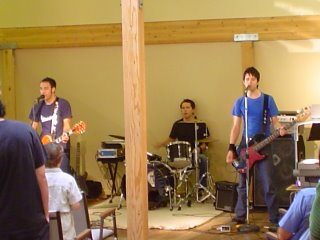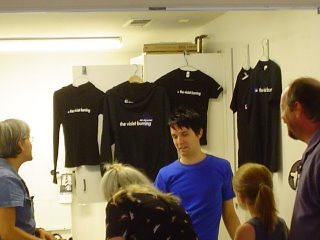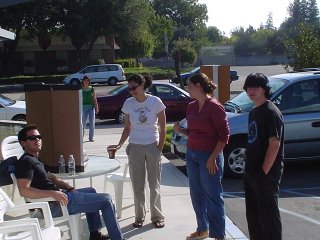Note: This is continued from Part One (found here), and (if you are reading this qualifying note) will be added to..so check back..
How then to "reduction of the seduction that so insidiously infiltrates the humblest Christian leader?
1. Gleaning from Systems Theory
2. (Dis)Arming Oneself with a "Loyal Opposition" Towel
3. Hacking the Empire of Signs
4.Unplugging...Literally
-------------
1. Gleaning From Family Systems Theory
"Fathers and mothers don't pastor large churches."
Ponder that quote for a moment before reading further.
When I first heard it, I immediately scribbled it into my notes; and wrote it tentatively (Isn't t too good to be true?) on my heart. It was a passing comment by a conference speaker, and as pastor/father of what most would categorize a "small" church, I obviously smelled much-needed good news.
I am aware that some would take the quote..against the grain of the speaker's intent.. as pure "bad news": a well-meaning father or mother-hearted pastor will never reach the "appropriate and ultimate" goal: a large church; one must therefore quit trying to be a parent and become more of an aggressive leader, etc. This has been called moving from shepherd to rancher, and has some validity to be sure. But to some of us experimenting with doing church more organically; never aiming to pastor a megachurch, it can also be a distraction from our primary focus. It could well be that a local pastor was never intended to be a rancher; that sounds more like the job description of an apostle or regional bishop. If you can't know the names of all your sheep, they're not yours anyway.
Not long ago, a woman...obviously from a previous (and much larger) church I pastored... came up to me in a store, "Hey, Pastor Dave! Long time, no see! Your sermons absolutely changed my life!" I was thrilled and honored; but I didn't have the heart to tell her the whole truth: Not only did I have no idea of who she was; she had no inkling that I would not know. We both knew we had never had a face-to-face conversation; that was not the issue. But in a larger church (too large for the senior pastor to know everyone's name), there is the "Johnny Carson" syndrome at work. Carson was swamped by people whenever he went out in public who called him by first name; after all he was in their bedroom every night (via "The Tonight Show"). The false intimacy that dogs media stars can be even more damaging in the church context. I could tell the woman would be crushed if I admitted I had no idea who she was...most likely a quiet there-every-Sunday "22nd pew" saint; but I had no memory of ever seeing her. The default church culture automatically attributes omniscience to the senior pastor (He or she will not
Which is kind of like the seducer.
Though I can celebrate large churches, and I am sure the conference speaker overstateed to make a prophetic pioint, I often pray to detox myself from the idolatry of numbers and the adultery of the edifice complex. Bigger is not in and of itself better.
And might even lead to runway sheep when they find out the unforgiveable: my shepherd ("But Pastor Dave/Johhny, you're in my church/bedroom every night, of course you know me.") doesn't have a clue about my name, and wouldn't
miss me if I'm gone.
I am a number at best; nobody at worst.
I guess I'm special...like everybody else.
Perhaps it is patently impossible and proudly counterproductive for a pastor who desires to be a relationally-connected father or mother, to let his or her flock enumerate past the "tipping point" . And I don't mean "breaking the 200 barrier" or the 2000 barrier; I mean capping off a congregation at what is almost universally seen as the maximum size of a group that allows authentic inter-relationship: 120-150! Our congregation is intentional about planting another congregation if/when we reach that size.
A Narene (thus very intentionally Wesleyan ) scholar has penned a challenge to Wesleyan-heritage churches to not be co-opted by the (perhaps inevitable in the Wesleyan tradition, if our first chapter is considered) push towards big numbers/buildings; and brings a needed balance to our argument (that due to his background and personality, Wesley may have inadvertenyly and indirectly advocated/covertly dictated bigger as inherently bigger...sexual connotation is intended and signifcant) by suggesting that small groups...maybe even small churches..were Wesley's (and God's) design all along.
That an article like "There's No Pulpit Like Home," spotlighted the house church/small church movement, was featured in TIME Magazine, is a sign of the time, an inevitable unearthing by secular media of the sublimated desire for intimacy in the church.
It concludes:
Jeffrey Mahan doesn't think the denominations need be anxious. "They don't have a franchise on religion. The challenge is for people to talk about what constitutes a full and adequate religious life, to be the church together...in the broadest sense." Or as Jesus put it, "For where two or three are gathered together in my name, there am I."This is terrain explored well in Jim Rutz's explosive books. He often calls attention to the "home-based" biblical model, and wonders how far we have come. He has us imagine coming to some friend house for dinner, and the host/father of the household begins spelling out an "order of service" for the evening. Life happens; family life emerges out of relationship, not bullet points. What does a family-flow "worship service" look like?:
Everyone dives in. In fact, if a wallflower is sitting in silence, someone will
notice and encourage the sharing of what's on his heart. No one is restricted
... unless you count the occasional motormouth who simply has to be reined in.
But hey, God loves gasbags, too. ..
In a simple church (home-based and open) you'll have your own weddings, baptisms and funerals. That's because your people are proactive, changing from spiritual consumers to spiritual producers who will overcome the world – not by force, but by their faith.
God may "love gasbags" and permit well-meaning leaders to use "not faith, but force," but it defintely doesn't sound like Plan A..
Which always involves family language .
Much of what we have already said about Wesley's family of origin has touched on the insights of "family systems theory." But at this point we desire to underscore some practical applications of FST towards counteracting the "seduction" model, wherever it manifests in church culture.
I am thankful I atended a seminary (Wesleyan, by the way) that was not too "holy" or compartmentalized to incorporate insights from systems theory. And now comes along
Len Hjalmarson of NextReformation.com , the first thinker I have seen apply the lens of family sytems theory as a corrective to some extemes of what is usually called the New Apostolic Refornation. Part 5 of his five-part series on "The New Apostolic Reformation." asks questions other seem too fearful to pry open.
C. Peter Wagner, who coined the term "New Apostolic Reformation," has suggested that this movement's single most unique factor; "the most radical of the nine changes from traditional Christianity" is "the amount of spiritual authority delegated by the Holy Spirit to individuals." ("The New Apostolic Reformation," pp. 19-20). This is a helpful and appropriate concept in many areas, but can lead to horrible abuse.
In our church we intentionally balance this Wagner insight with Wolfgang Simson's more egalitarian
 emphasis. Or as one pastor has articulated a way of combining the best of both models:
emphasis. Or as one pastor has articulated a way of combining the best of both models:Each member may manifest the presence and activity of the Spirit. The list ofObviously, when worked, that model changes everything One of the "value statements" at our congregation is "Trading Instruments" This motto is based on ana rticle I read about the rock group R.E.M., whose members are apparently so versatile and talented that on any given night, or CD, they could easily all swap instruments and still sound just as polished and professional. In our congregtaion, we leave room for "holy experimentation." Each person may well "have" a fundamental gift or strength, according to personality and/or spiritual gift. But their giftedness is not so static, and God so entreched that they can't once in awhile be mightily (or mildly) used plyaing a different instrument/hat/gift/role.
nine manifestations seems to be illustrative rather than comprehensive. They are
not permanent gifts given to individuals, but ways in which the Holy Spirit may
manifest himself through any one of the persons present. (Catherine Curran)
I am not unawre of the irony and potential sabotage of this "value statement" for the whole congregtation not emerging organically from the congregation (or a non-pastor), but was handed down from the holy mountain by me, the designated holy leader/visionary in residence. But I hope that at heart, I am a father...no, elder brother...how about "equal" ...okay:slave.
The heart of apostolic service is a willingness to embrace the cross. ...
Every father has gone through a stripping process in fathering where he has learned to give himself for his children, often at personal cost. Every mother who hasendured birthing and then wakes up twice during the night to nurse her baby pays the cost ofparenting in her body. Any time one must stand against the cultural tide with ateenage daughter or son, one discovers that parenting isn’t always glorious.
Paul characterizes apostolic ministry as parenting. “For if you have many
tutors in Christ, yet you do not have many fathers” (1 Cor. 4:15). Paul not only considers himself a father in Christ, but continually demonstrates this characteristic in his appeals. He will “most gladly spend and be expended for [their] souls,” (2 Cor. 12:15) and he is “exhorting and imploring and encouraging each one of you, as a father would his children” (1 Thess. 2:11). -Len Hjalmarson
Not only is it abundantly clear from scripture that "mothers and fathers don't pastor large churches, " it is hard to imagine that by "Exhorting and imploring each one of you" , Paul meant en masse from a pulpit, but just as he said: "as a father would his children." That is, personally, in person. The Greek in this verse actually implies "exactly as father would." How could a father not know his children?
Don't answer that.
NOTE: THIS CHAPTER TO BE CONTINUED LATER>>right here


